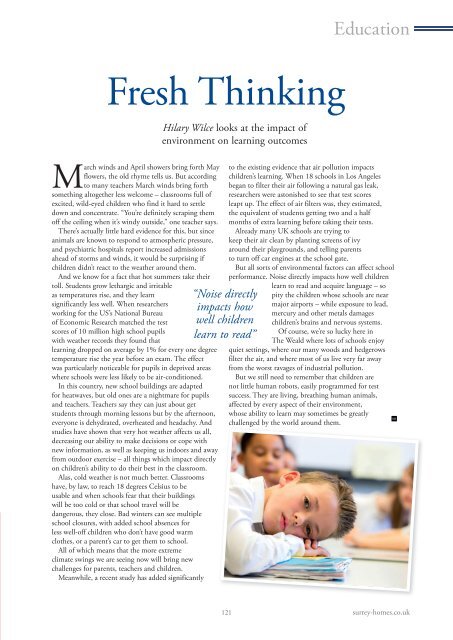Surrey Homes | SH65 | March 2020 | Good Living supplement inside
The lifestyle magazine for Surrey - Inspirational Interiors, Fabulous Fashion, Delicious Dishes
The lifestyle magazine for Surrey - Inspirational Interiors, Fabulous Fashion, Delicious Dishes
Create successful ePaper yourself
Turn your PDF publications into a flip-book with our unique Google optimized e-Paper software.
Education<br />
Fresh Thinking<br />
Hilary Wilce looks at the impact of<br />
environment on learning outcomes<br />
<strong>March</strong> winds and April showers bring forth May<br />
flowers, the old rhyme tells us. But according<br />
to many teachers <strong>March</strong> winds bring forth<br />
something altogether less welcome – classrooms full of<br />
excited, wild-eyed children who find it hard to settle<br />
down and concentrate. “You’re definitely scraping them<br />
off the ceiling when it’s windy outside,” one teacher says.<br />
There’s actually little hard evidence for this, but since<br />
animals are known to respond to atmospheric pressure,<br />
and psychiatric hospitals report increased admissions<br />
ahead of storms and winds, it would be surprising if<br />
children didn’t react to the weather around them.<br />
And we know for a fact that hot summers take their<br />
toll. Students grow lethargic and irritable<br />
as temperatures rise, and they learn<br />
significantly less well. When researchers<br />
working for the US’s National Bureau<br />
of Economic Research matched the test<br />
scores of 10 million high school pupils<br />
with weather records they found that<br />
learning dropped on average by 1% for every one degree<br />
temperature rise the year before an exam. The effect<br />
was particularly noticeable for pupils in deprived areas<br />
where schools were less likely to be air-conditioned.<br />
In this country, new school buildings are adapted<br />
for heatwaves, but old ones are a nightmare for pupils<br />
and teachers. Teachers say they can just about get<br />
students through morning lessons but by the afternoon,<br />
everyone is dehydrated, overheated and headachy. And<br />
studies have shown that very hot weather affects us all,<br />
decreasing our ability to make decisions or cope with<br />
new information, as well as keeping us indoors and away<br />
from outdoor exercise – all things which impact directly<br />
on children’s ability to do their best in the classroom.<br />
Alas, cold weather is not much better. Classrooms<br />
have, by law, to reach 18 degrees Celsius to be<br />
usable and when schools fear that their buildings<br />
will be too cold or that school travel will be<br />
dangerous, they close. Bad winters can see multiple<br />
school closures, with added school absences for<br />
less well-off children who don’t have good warm<br />
clothes, or a parent’s car to get them to school.<br />
All of which means that the more extreme<br />
climate swings we are seeing now will bring new<br />
challenges for parents, teachers and children.<br />
Meanwhile, a recent study has added significantly<br />
“Noise directly<br />
impacts how<br />
well children<br />
learn to read”<br />
to the existing evidence that air pollution impacts<br />
children’s learning. When 18 schools in Los Angeles<br />
began to filter their air following a natural gas leak,<br />
researchers were astonished to see that test scores<br />
leapt up. The effect of air filters was, they estimated,<br />
the equivalent of students getting two and a half<br />
months of extra learning before taking their tests.<br />
Already many UK schools are trying to<br />
keep their air clean by planting screens of ivy<br />
around their playgrounds, and telling parents<br />
to turn off car engines at the school gate.<br />
But all sorts of environmental factors can affect school<br />
performance. Noise directly impacts how well children<br />
learn to read and acquire language – so<br />
pity the children whose schools are near<br />
major airports – while exposure to lead,<br />
mercury and other metals damages<br />
children’s brains and nervous systems.<br />
Of course, we’re so lucky here in<br />
The Weald where lots of schools enjoy<br />
quiet settings, where our many woods and hedgerows<br />
filter the air, and where most of us live very far away<br />
from the worst ravages of industrial pollution.<br />
But we still need to remember that children are<br />
not little human robots, easily programmed for test<br />
success. They are living, breathing human animals,<br />
affected by every aspect of their environment,<br />
whose ability to learn may sometimes be greatly<br />
challenged by the world around them.<br />
121 surrey-homes.co.uk


















